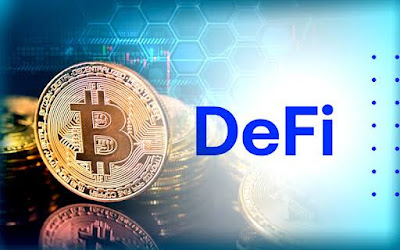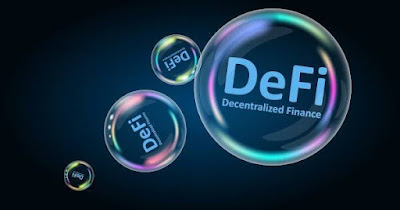In this piece, we will analyze and contrast the advantages of DeFi and Bitcoin.
DeFi and Bitcoin are frequently mistaken since they are used in the same context. Since the release of Bitcoin in 2009, blockchain, the technology that powers both DeFi and Bitcoin, has evolved significantly.
Altcoins, NFTs (non-fungible tokens), and defi development extend beyond cryptocurrencies such as bitcoin and into the financial sector. In the end, they all want the same thing: Smart Contracts to make everything entirely transparent.
What are Bitcoin and DeFi?
DeFi, unlike Bitcoin, is a decentralized digital money that also provides financial services. Bitcoin, like currency, is a digital asset based on a distributed ledger. On the DeFi platform, users may lend, borrow, and trade Bitcoin and other cryptocurrencies in the same way that they can with traditional banks. Loans, interest, and NFTs can be obtained through Ethereum-based DeFi projects. Consumers can function as a source of currency for dispersed exchanges by using DeFi applications.
Both firms want to do business without the need of middlemen. Most of the time, paid middlemen are utilized to facilitate these types of transactions. Users who move to digital versions may be able to save more money and have greater control over their "bank account" or digital wallet. According to John Wu, CEO of Ava Labs, defi development services run "without a central server looking over the entire system."
How do they work?
Smart contracts enable transactions to take place when the "if...then" condition is fulfilled. Proof-of-Work and Proof-of-Stake are two methods by which Bitcoin miners authenticate the validity of a financial transaction. Bitcoin facilitates and reduces the cost of sending money across borders. DeFi has several uses in various sectors. Since 2009, Bitcoin has been the most popular cryptocurrency in the world. People's increasingly complex financial requirements have resulted in a surge in defi crypto popularity.
The risks involved
Every day, investors confront new dangers such as cryptocurrency frauds, trading losses due to market volatility, and so on. Both defi solution and Bitcoin are plagued by issues. "The risk and profit for each DeFi system and project are distinct," explains Meltem Demirors, CoinShares' Chief Strategy Officer. This is what you could receive if you take such a large risk. Taking chances yields high returns.
DeFi is a new cryptocurrency that is rapidly gaining in popularity. According to Wu, this expansion might lead to an increase in fraud. He goes on to argue that DeFi's growth and earnings have been so remarkable that the defi development company future potential may appear to be unachievable. If you are unsure about something in the code, follow your instincts or ask educated, neutral members of the community to review it.
Traditional financial institutions may take on a new aspect online as the number of digital currencies expands. Is it simpler to do business if there are no middlemen? Or is it simpler to perpetrate fraud? Unknown.
Crypto risks
Even those who have never used bitcoin before understand how rapidly it may change. Cryptocurrency values are constantly fluctuating. Bitcoin's price fluctuated between £22,000 and £48,000 during July and October of 2021.
Because of these boom-and-bust cycles, predicting the value of cryptocurrencies in the future is impossible. This is true for any investment, but in the cryptocurrency market, where values can fluctuate rapidly and dramatically for unknown causes (such as Elon Musk's tweets), you must be more cautious.
When storing bitcoins, you must be more cautious than when storing other types of valuables.Your bitcoins should be kept in a password-protected and secure digital wallet. In addition to the lengthy private key, you will be given a 12-word "seed phrase" that will allow you to access your wallet and retrieve your money. You can never get your bitcoin back if you lose it or let it expire since you haven't used it in a long time.
People might make a number of blunders while investing in cryptocurrency. People's faults or hacks can make bitcoin storage less secure. Hackers stole $600 million in cryptocurrencies from the Blockchain platform Poly Network in August 2021.
Hot wallets are software applications that may be installed on a computer or mobile device and used to store bitcoin. They are simple to locate and use online, but thieves may still gain access since they require an internet connection. Cold wallets are devices that hold digital cash that is not stored on a computer. Cold wallets are classified into two types.
Hardware wallets are devices that you plug in and use to store currencies. In a paper wallet, you may keep your public address and private key safe. You might lose or destroy your crypto assets if you don't have a backup for either cold wallet. Investors in cryptocurrency should employ both hot and cold storage strategies.
The bitcoin market is highly structured and controlled (although if global governments have their way, this may change in the future). As a result, people who invest in bitcoin are more likely to become victims of crimes such as theft and hacking. Because of this, as well as the volatility of cryptocurrency pricing, the Financial Conduct Authority warns investors that they should be prepared to lose their whole investment.
There have been a number of bitcoin frauds because the FCA is not looking. An "exit scam" is a sort of fraud frequent in the cryptocurrency sector in which early investors steal a new coin. There are also phishing emails, phony cloud mining platforms, and phony endorsements from celebrities.
Defi risks
Working in the realm of defi development is analogous to creating a complex network of smart contracts. Digital contracts may be configured to function totally autonomously on a blockchain network.
Smart contracts reduce the possibility of a third party being harmed. Currency trades, for example, are settled concurrently on a decentralized exchange. Smart contracts might be hampered by technological errors. A payment may be lost if it is sent to the incorrect network or address. A bank cannot terminate a smart contract and refund previously paid funds.
When it comes to smart contracts, oracles are also a concern. Oracles are used to operate smart contracts depending on external data, such as price feeds. When oracles fail or are compromised by malicious individuals, smart contracts may not be carried out. Smart contracts may include flaws.
Smart contracts are being used in unexpected ways by entrepreneurs who are combining them. When they collaborate, they create entirely new goods and services. There are things known as insects. Another typical explanation is attacks on those who have done nothing wrong.
Because the DeFi source code is out to the public, anybody may examine it and possibly uncover faults. When the code is straightforward, bugs are easier to repair. According to Eric S. Raymond, if you look closely, you can find every defect.
This is true of both good and evil people. They take advantage of programming flaws. Hackers may attempt to get access to people's defi smart contract development networks.
Smart contracts include various hazards that can be mitigated with the use of DeFi technology. Vulnerabilities may be discovered prior to the mainnet deployment by extensive testing and code audits.













No comments